| Srl | Item |
| 1 |
ID:
111735
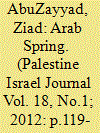

|
|
|
|
|
| Publication |
2012.
|
| Summary/Abstract |
The recent decision of the Arab League foreign ministers (Nov. 12, 2011) to suspend Syria's membership in the Arab League was interpreted by observers as the last act before international intervention in Syria; the same had happened earlier in Libya. But the Arab League's decision came after Syrian President Bashar al-Assad failed to understand the course of events in his country in light of what had happened in other rebelling Arab countries, leaving the Arab League countries with no option but to ask the Security Council to adopt the Arab initiative and impose sanctions against the Syrian regime. Such a decision by the Arab League in the past opened the door for NATO intervention in Libya and eventually may serve to allow outside intervention in Syria as well.
|
|
|
|
|
|
|
|
|
|
|
|
|
|
|
|
| 2 |
ID:
110924
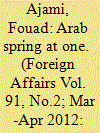

|
|
|
|
|
| Publication |
2012.
|
| Summary/Abstract |
Throughout 2011, a rhythmic chant echoed across the Arab lands: "The people want to topple the regime." It skipped borders with ease, carried in newspapers and magazines, on Twitter and Facebook, on the airwaves of al Jazeera and al Arabiya. Arab nationalism had been written off, but here, in full bloom, was what certainly looked like a pan-Arab awakening. Young people in search of political freedom and economic opportunity, weary of waking up to the same tedium day after day, rose up against their sclerotic masters.
|
|
|
|
|
|
|
|
|
|
|
|
|
|
|
|
| 3 |
ID:
106101
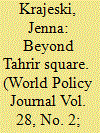

|
|
|
| 4 |
ID:
106388
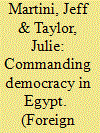

|
|
|
|
|
| Publication |
2011.
|
| Summary/Abstract |
Despite its vows to speed Egypt toward elections, the country's military leadership is actually ambivalent about democracy. Above all, Egypt's generals want to preserve stability and protect their privileges. But having unleashed democracy, the military may not be able to control it -- especially if Washington keeps up the pressure to move forward.
|
|
|
|
|
|
|
|
|
|
|
|
|
|
|
|
| 5 |
ID:
106118


|
|
|
| 6 |
ID:
113400


|
|
|
|
|
| Publication |
2012.
|
| Summary/Abstract |
Last spring, while Tunisians and Egyptians erupted in the most determined and optimistic political protest movements seen in two generations, southern Sudanese prepared to secede. And in July, after months of watching dramatic images from the demonstrators in Tahrir Square, the world was presented with pictures of a new country with a beautiful, colorful new flag, of thousands of people who had voted into existence the Republic of South Sudan. On Al-Jazeera, CNN, and BBC, interviews with southern Sudanese revealed the profound relief and freedom that these new citizens felt as they repeated the word "liberation" to describe their feelings in this heady moment of independence.
|
|
|
|
|
|
|
|
|
|
|
|
|
|
|
|
| 7 |
ID:
110153
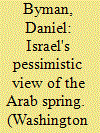

|
|
|
| 8 |
ID:
111931
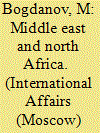

|
|
|
| 9 |
ID:
123149


|
|
|
| 10 |
ID:
105086
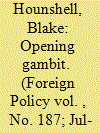

|
|
|
|
|
| Publication |
2011.
|
| Summary/Abstract |
It was late at night on Tahrir Square. Egypt's embattled leader, Hosni Mubarak, had just given his bizarre speech vowing not to step down, and I followed an enraged crowd of several hundred protesters over to the state television building along the Nile, where they were gathering to denounce the official media for defaming the revolution. Up front, near the entrance, a fired-up speaker called out from a bullhorn: "Down with Anas al-Fiqi, the lying minister of information! Down with the corrupt regime!" To one side stood a different category of rebel entirely: scruffy guys and gals staring down at their cell phones. They were tweeting.
|
|
|
|
|
|
|
|
|
|
|
|
|
|
|
|
| 11 |
ID:
139415
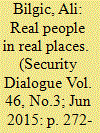

|
|
|
|
|
| Summary/Abstract |
The objective of emancipatory security theory is to examine the insecurities of individuals and social groups that stem from oppressive power processes, relations, and structures. However, the image of power in emancipatory security studies does not correspond to such a normative and analytical motivation. This renders the theory susceptible to substantial criticism on the grounds of inadequate analysis of resisting individuals as agents of security in their own localities. To address this issue, the present article conceptualizes ‘emancipatory power’. In this exercise, Hannah Arendt’s understanding of power, enriched by Judith Butler’s concept of performativity and feminist insights, will be used as the theoretical foundation to tailor collective power based on trust in a ‘moment’ of emancipation. Collective power will be illustrated by references to the protests in Cairo’s Tahrir Square in 2011.
|
|
|
|
|
|
|
|
|
|
|
|
|
|
|
|
| 12 |
ID:
125165
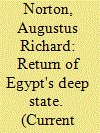

|
|
|
|
|
| Publication |
2013.
|
| Summary/Abstract |
Not only was the paramount role of the military unimpeded after the exit of Mubarak, but other key institutions were undiminished in their power.
|
|
|
|
|
|
|
|
|
|
|
|
|
|
|
|
| 13 |
ID:
111230
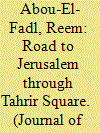

|
|
|
|
|
| Publication |
2012.
|
| Summary/Abstract |
This article addresses an aspect of Egypt's 2011 revolution almost entirely ignored in most Western media accounts: Israel and Palestine as prominent themes of protest. In reviewing Egyptian mobilization opposing normalization and in support of the Palestinian cause starting from Sadat's peace initiative of the mid-1970s, the author shows how the anti-Mubarak movement that took off as of the mid-2000s built on the Palestine activism and networks already in place. While the trigger of the revolution and the focus of its first eighteen days was domestic change, the article shows how domestic and foreign policy issues (especially Israel and Palestine) were inextricably intertwined, with the leadership bodies of the revolution involved in both.
|
|
|
|
|
|
|
|
|
|
|
|
|
|
|
|
| 14 |
ID:
184948
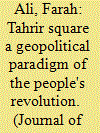

|
|
|
| 15 |
ID:
150957
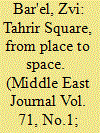

|
|
|
|
|
| Summary/Abstract |
Due to its role in the Egyptian Revolution, Tahrir Square in Cairo became synonymous with the Arab Spring. During the protests it was transformed from a physical place into a symbolic space and then into an abstract space. This article follows the stages of the square's transformation and aims to expose the implications that this transformation has on public discourse and on the political legitimacy that abstract spaces might bestow on regimes in general, and particularly in Egypt.
|
|
|
|
|
|
|
|
|
|
|
|
|
|
|
|
| 16 |
ID:
161093


|
|
|
|
|
| Summary/Abstract |
This article looks into the meaning of Tahrir Square before, during, and after the January 25 revolution. We employ Lefebvre's conceptual triad of space to understand how space is not merely a physical form, but also the product of relations between natural and social objects in this space. To understand how these relations changed dramatically after January 25, we will draw on Sewell's insight into how space is a constituent aspect of contentious politics. We discuss the way in which the political space of Tahrir Square went through distinct phases during and after the Egyptian revolution, from counter-space, to eventually a change in the conceived space of Tahrir Square, but not according to the principles of the newly created lived space during the 18 days.
|
|
|
|
|
|
|
|
|
|
|
|
|
|
|
|
| 17 |
ID:
106387


|
|
|
|
|
| Publication |
2011.
|
| Summary/Abstract |
To understand the Brotherhood's prospects in Egypt's upcoming elections, one has to understand the organization itself. This intensely disciplined operation has an intricate system for recruitment and promotion and a devoutly loyal membership -- one likely to triumph at the polls and move Egypt in a decidedly theocratic, anti-Western direction.
|
|
|
|
|
|
|
|
|
|
|
|
|
|
|
|
| 18 |
ID:
109775
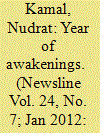

|
|
|